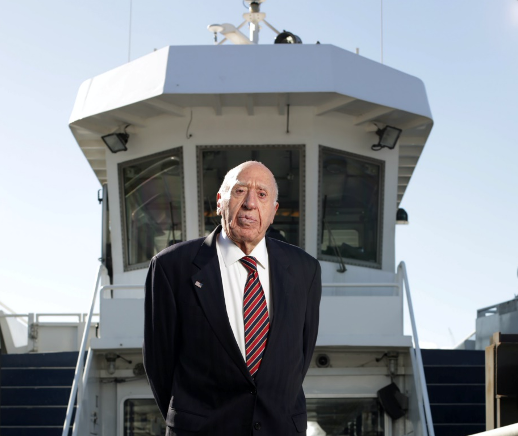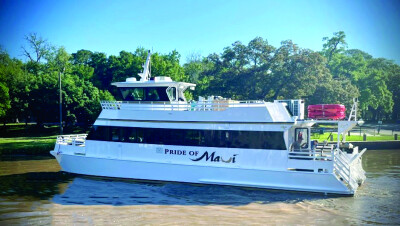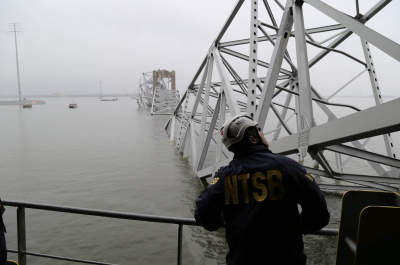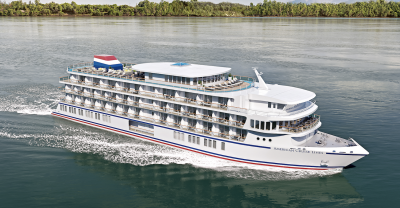NY Waterway founder and president Arthur E. Imperatore Sr., an entrepreneur who built a complete New York City commuter ferry system, died Nov. 18 at the age of 95. (Read WorkBoat's 2016 interview with Imperatore.)
Imperatore’s career spanned more than seven decades and included various ventures from mining to real estate, from sports teams to transportation. He founded NY Waterway in 1986 in Weehawken, N.J.,and built it into a mass transit system which has transported almost 300 million people to date.
NY Waterway ferries became a vital component in the New York metro area mass transit network and a life-saving backup system when other transit modes are disrupted. Ferry crews evacuated 150,000 people from Manhattan on 9/11 and have rescued hundreds of people from area waters, including 143 people from Flight 1547 – the “Miracle on the Hudson” when an airliner ditched in the river, which has been called the most successful marine rescue in aviation history.
Early skeptics derided his vision as “Arthur’s Folly,” but Imperatore drew from nearly 40 years of experience in the transport industry to pioneer a ferry-bus network. With his stepson, Armand Pohan, Imperatore ran the company until his death.
Imperatore’s dream was to revitalize his native New Jersey community on the Hudson River, developing NY Waterway as the keystone. Starting with the company’s Port Imperial terminus in Weehawken, Imperatore developed a thriving residential and commercial community. As his vessels transported passengers to and from New York City, his fleet of buses made the ferry service accessible to the surrounding towns.
The ferry-bus network became the infrastructure that supported waterfront development from Edgewater to Jersey City, a new “Gold Coast” that boosted local and state economies. The ferry-bus network became an international model for effective, coordinated mass transportation systems.
Born on July 8, 1925, to Italian fruit grocer Eugene Imperatore and his wife Teresa (née Sorrentino) in West New York, N.J., Imperatore was the ninth of 10 children living in a two-bedroom apartment above his father’s grocery. He began earning a wage at age five, and by age eight had set a goal of earning 10 cents per week to help support his family. Starting as a deliver boy for his father’s grocery, Imperatore also worked as a Western Union messenger and shoeshine boy. His strong work ethic and entrepreneurial drive continued to propel him forward.
Imperatore carried that work ethic and sense of duty into the U.S. Army Air Corps where he served as a navigator on B-24 Liberators and B-29 Superfortresses during World War II. After the war in 1947, he and his brothers started A-P-A Transport Corp. with two surplus Army trucks and grew to become the fourth largest and most profitable interstate freight trucking company in the U.S. At A-P-A he instituted stringent productivity and efficiency systems which are emulated today across numerous industries.
The notion that a company’s greatest asset is a motivated and involved workforce is a common thread that runs throughout Imperatore’s successful enterprises. He was committed to connecting, communicating, and giving back to all of his employees, whom he looked upon as extended family. As an employer, he set the performance bar high to inspire employees to reach the potential he believed they all had — demanding excellence while also leading by example.
Imperatore was widely regarded for his responsible corporate citizenship, family values, and love for country. His support and engagement in charitable causes included medical research, social services and education.
Throughout his life, Imperatore was honored by business and civic organizations for his corporate and humanitarian contributions. Among his awards were three honorary doctoral degrees, the prestigious Horatio Alger Award, and the first U.S. Senate Productivity Award, presented to him by former New Jersey Senator Bill Bradley. Never one to rest on his laurels, Imperatore contemplated the possibilities of what he might yet achieve during his 2017 induction into the New Jersey Hall of Fame, saying “I talk to God every once in a while. I tell him ‘listen, God, I know you might have your eye on me – however, I still have a lot of work to do.’”
Imperatore was an avid American history buff and a patron of the arts who loved music, especially opera and Cole Porter. At age 70, he took up the game of golf and was, from then on, a devoted fan of the sport. He will be remembered for his warm demeanor, dry sense of humor, iron will, deep intelligence, and boundless ability to dream.
He is survived by his wife, Dr. Mei-Ling Yee-Imperatore; his son, Arthur E. Imperatore, Jr.; his daughter, India Imperatore; his stepson and daughter-in-law Armand Pohan and Nancy O. Rieger; his step-children George (Elizabeth) Carr, Alexander (Renée) Carr, and Arielle Moylen; eight grandchildren; and two step-grandchildren. He was predeceased by parents and his nine brothers and sisters.
A memorial service will be planned for a future date.
In lieu of flowers, the family asks to consider remembering Imperatore with a contribution to the foundations of his two closest physicians, Dr. Valentin Fuster and Dr. David Adams, who worked tirelessly to provide him with quality years of life.





